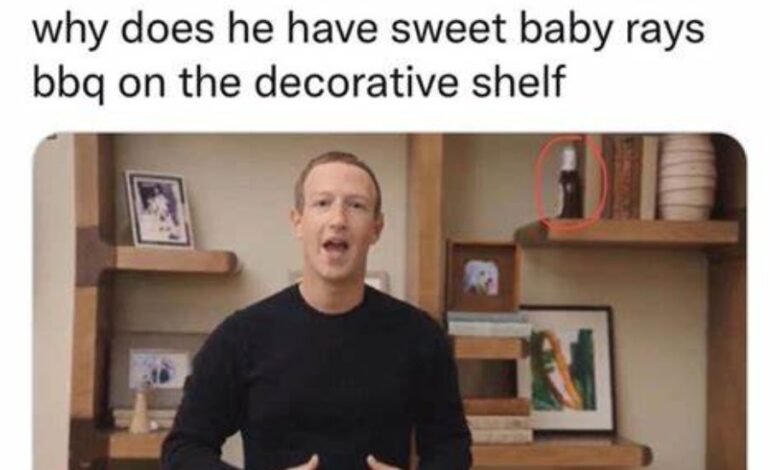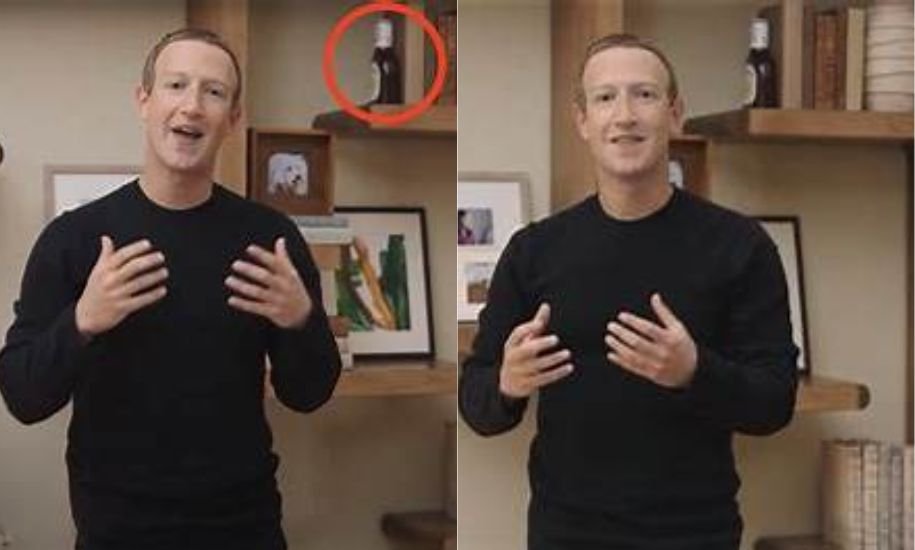Mark Zuckerberg BBQ Sauce: From Smoking Meats to Meme Legend

When the history of internet memes is written, some of the strangest chapters will involve the most unexpected figures. Among these is Mark Zuckerberg, the billionaire founder of Facebook (now Meta), and his unusual connection to a humble bottle of Sweet Baby Ray’s BBQ Sauce. What started as a quirky moment in a livestream has since become an enduring cultural joke, resurfacing during Meta’s rebrand and continuing to fuel internet commentary years later.
The “Mark Zuckerberg BBQ sauce” saga is more than just a random internet gag. It is a case study in how meme culture, corporate branding, and human curiosity intersect — showing how even the smallest, most mundane detail can be magnified into a viral phenomenon. This article dives deep into the story, tracing its roots, analyzing its impact, and explaining why Sweet Baby Ray’s sauce has become a lasting part of Zuckerberg’s public image.
The Origin: Zuckerberg’s 2016 “Smoking Meats” Livestream
The saga begins in October 2016, when Mark Zuckerberg hosted a Facebook Live video from his backyard. The stream, titled “Live grilling in my backyard,” was intended to showcase the casual, everyday use of Facebook Live — the company’s big push into video at the time.
Instead of staying on message about the platform, Zuckerberg meandered into a somewhat robotic but oddly enthusiastic commentary about his cookout. Viewers were introduced to what became his most famous repeated phrase: “smoking meats.” Over and over again, Zuckerberg referenced his excitement about smoking brisket, ribs, and more.
But what stood out most wasn’t just the repetitive phrasing. It was the repeated product shoutout to Sweet Baby Ray’s BBQ Sauce. Zuckerberg mentioned it multiple times, almost like a commercial, while gesturing toward the bottles. He referred to it as his go-to choice, praising the sauce as if he were a paid spokesperson.
The video, awkward in tone and mannerisms, quickly gained traction online. People found his delivery strange, stilted, and unintentionally funny. Soon, remix videos, supercuts, and parody edits flooded YouTube, immortalizing Zuckerberg’s odd grilling persona.
The Meme Evolution: “Smoking Meats” Goes Viral
By 2017, the livestream had become meme gold. Creators looped the phrase “smoking meats” for hours on end. Others edited the video into surreal, almost dystopian remixes that highlighted Zuckerberg’s flat affect and uncanny delivery.
The internet had found a perfect storm: a tech billionaire with a reputation for robotic speech, paired with a bottle of BBQ sauce. Sweet Baby Ray’s, without any marketing effort, suddenly became linked to one of the biggest names in tech.
Between 2017 and 2020, compilations like “10 Hours of Mark Zuckerberg Smoking Meats” amassed millions of views. The meme became shorthand for Zuckerberg’s awkwardness — proof that even in casual settings, he seemed somehow disconnected from normal human behavior.
2021 Meta Rebrand: The Return of Sweet Baby Ray’s
Just when the joke might have faded into obscurity, October 28, 2021 revived it in spectacular fashion. During Facebook’s major announcement rebranding itself as Meta, viewers noticed a peculiar detail in Zuckerberg’s office background.
On the bookshelf behind him, acting as a bookend, sat a bottle of Sweet Baby Ray’s BBQ Sauce. It wasn’t subtle — it was clearly staged, intentionally placed in full view of the camera.
The internet immediately erupted. Was this a coincidence? Was Zuckerberg trolling the audience by leaning into his most famous meme? Or was it an inside joke to show he was in on the fun?
News outlets and blogs rushed to cover the discovery. Articles from People, Uproxx, Distractify, Mashed, and others highlighted the sauce’s cameo. Some argued it was a deliberate nod to the past meme, especially given Zuckerberg’s own comments that the “smoking meats” meme was one of his favorites.

Reaction: Brands and Blogs Jump In
The appearance of Sweet Baby Ray’s in the Meta video sparked a wave of brand participation. Companies like Wendy’s, Slim Jim, and Busch Beer joined the conversation on Twitter, making jokes about Zuckerberg’s taste in condiments.
Meanwhile, food blogs like Mashed and culture outlets like Uproxx dissected the symbolism. Some suggested the placement was Zuckerberg attempting to “humanize” himself amid controversy about Facebook’s role in misinformation and whistleblower scandals. Others saw it as an intentional act of self-parody — Zuckerberg acknowledging his own meme status.
Mainstream media outlets like NBC Chicago and Newsweek cataloged the viral reaction, demonstrating how quickly a single product prop could hijack the news cycle.
Why This Meme Works: The Power of the Mundane
What makes the “Mark Zuckerberg BBQ sauce” meme so sticky? Several factors explain its longevity:
-
Unexpected Juxtaposition: A billionaire tech CEO earnestly praising BBQ sauce is inherently funny.
-
Awkward Delivery: Zuckerberg’s stilted mannerisms amplify the humor, making the clips feel surreal.
-
Cultural Timing: In 2016, people were skeptical about Facebook’s growing influence. The goofy livestream humanized him — but in an oddly unsettling way.
-
Relatability: Everyone uses condiments. The fact that Zuckerberg fixated on something so everyday made him seem more accessible — but also strangely robotic.
-
Repetition and Remixes: The phrase “smoking meats” became a soundbite tailor-made for meme loops, ensuring its survival in internet culture.
Sweet Baby Ray’s: The Accidental Star
For Sweet Baby Ray’s, this was a marketing dream. The brand didn’t pay for the placement and yet became immortalized in one of the most enduring internet memes.
The sauce itself is widely popular in the U.S., known for its sweet and tangy flavor profile. After the 2016 livestream, searches for the brand spiked. When the 2021 Meta video aired, Sweet Baby Ray’s once again enjoyed free publicity — mentioned across headlines, Twitter threads, and YouTube breakdowns.
While the company didn’t officially launch a major campaign around it, the brand benefitted enormously from sheer visibility. In a crowded condiment market, few things are as valuable as becoming a household name through viral culture.
Meme Culture Meets Corporate Branding
The “Mark Zuckerberg BBQ sauce” story reveals how memes increasingly influence corporate branding:
-
Intentional Placement: By 2021, Zuckerberg knew the meme’s history. Placing the sauce bottle was likely no accident.
-
Self-Referential Humor: Tech CEOs often struggle with relatability. By leaning into the joke, Zuckerberg signaled he was aware of his public image.
-
Viral Fuel: The prop ensured coverage of Meta’s rebrand extended far beyond the company’s intended messaging. Even people uninterested in virtual reality or the metaverse tuned in — for the BBQ sauce.
Broader Implications: Humanity in the Age of Tech Titans
The sauce meme also speaks to a deeper cultural need: people want to see the human side of billionaires who control major parts of digital life.
For Zuckerberg, who has often been criticized for seeming robotic or emotionless, the BBQ sauce meme provides a rare — if awkward — glimpse of relatability. Even if it comes off forced, it grounds him in something ordinary.
It also shows how small details can overshadow major corporate announcements. Despite Meta unveiling a new name and direction, much of the conversation focused on a bottle of sauce. This reflects the internet’s ability to latch onto the trivial and make it defining.
Legacy: Why the Meme Endures
Nearly a decade after the original livestream, the “Mark Zuckerberg BBQ sauce” meme continues to circulate. It has become part of his digital persona, alongside other moments like his robotic testimony before Congress or surfing with too much sunscreen on his face.
In many ways, it will outlive the rebrand itself. While Meta struggles to sell the public on its vision of the metaverse, people still joke about Zuckerberg and his beloved sauce.
The lesson is clear: once the internet seizes on a moment, it never lets go. And for Zuckerberg, BBQ sauce may always be part of his personal brand.
Conclusion
The story of “Mark Zuckerberg BBQ sauce” is a testament to how internet culture transforms the ordinary into the extraordinary. From a backyard cookout livestream to a staged prop in a billion-dollar rebrand announcement, Sweet Baby Ray’s has become permanently tied to Zuckerberg’s public image.
It’s strange, funny, and oddly human — a reminder that in the digital age, memes shape narratives as much as official press releases.
And perhaps that’s the real takeaway: the internet doesn’t just consume news; it flavors it — sometimes with a dash of BBQ sauce.
Published by News Zio



